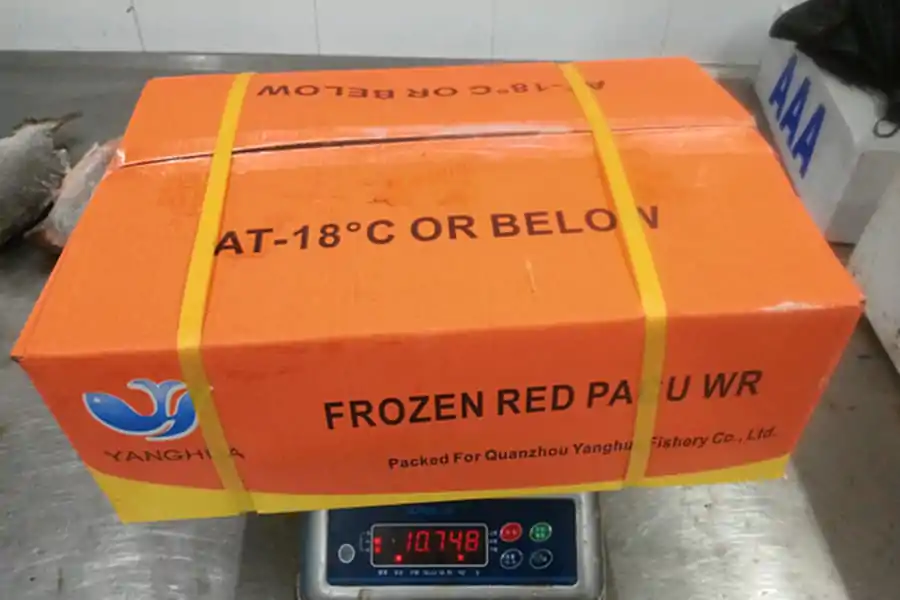Struggling with inconsistent suppliers? Poor-quality Red Pomfret can damage your reputation and profits.
You need a partner you can trust to help your business grow.
To properly vet a new Red Pomfret supplier, you must ask specific questions about their quality control, food safety certifications, piece count guarantees, production capacity, and communication methods. Getting clear answers to these questions is the first step to finding a reliable, long-term partner for your fish business.
Finding a great supplier is about more than just a reasonable price. It’s about building a partnership based on trust. The right supplier sends you fish that keeps your customers coming back.
The wrong one creates constant problems. I’ve worked with many importers in Africa and have seen firsthand how asking the right questions can make all the difference.
Let’s dive into the essential questions you must ask to protect your business and secure a steady supply of high-quality Red Pomfret.
1. How do you guarantee fish quality and freshness?
Worried about receiving soft, mushy fish? Poor freshness disappoints your customers and hurts your sales.
You need a supplier who consistently demonstrates their commitment to excellent quality in every shipment.
A top supplier guarantees quality with strict, documented processes. These should cover everything, from how the raw fish is handled upon arrival at the factory to temperature controls during processing and a final quality check before the container is sealed.
Ask them to explain their quality system step by step.
The Journey of a Quality Red Pomfret
To truly understand a supplier’s commitment, you need to know their process. The journey from the sea to your warehouse involves several steps where quality can be compromised.
In my experience, the best suppliers have strict controls at every stage. They don’t just check the fish at the end; they maintain quality throughout.
For example, the fish must be chilled or frozen immediately after being caught. At the factory, it must be kept at a stable, low temperature. Any deviation can affect the texture and taste.
I always tell my clients to ask for specifics. A vague answer is a red flag. A good supplier will be proud to share the details of their quality assurance process with you.
Here are the key checkpoints to ask about:
- Raw Material Inspection: How do they check the fish when it first arrives?
- Processing Controls: What are the temperature and hygiene standards in their processing facility?
- Final Product Check: Who performs the final inspection, and what do they look for before the product is packed?
2. Can you provide your food safety certifications?
Feeling anxious about food safety standards? Selling fish that isn’t certified is a significant risk.
It can harm your customers’ health and destroy your business’s reputation overnight.
A professional supplier will gladly share their food safety certifications. Look for well-known international standards, such as BRC, ASC, BAP, or FDA registration.
These documents are more than just paper; they demonstrate that the supplier adheres to strict rules for hygiene, safety, and traceability. Always request current copies.
What Certifications Mean
Certifications are your insurance policy. They demonstrate that an independent third party has inspected the supplier’s factory and confirmed that it meets global standards.
It means the supplier has invested a significant amount of time and money into their operations.
This is a strong sign that they are serious about their business and about protecting yours.
When I started my company, getting these certifications was a top priority. It showed our partners that we were committed to the highest level of food safety.
Don’t just accept a "yes" when you ask about certifications; ask to see the actual documents.
| Certification | What It Means for You |
|---|---|
| BRC | Global Standard for Food Safety. This ensures that the factory has a robust system to manage product safety, integrity, legality, and quality. |
| ASC/BAP | Aquaculture Stewardship/Best Aquaculture Practices. This confirms that the fish is farmed responsibly, with care for the environment and a focus on food safety. |
| FDA | Food and Drug Administration (USA). Registration is required for exporting to the US and shows they meet high safety benchmarks. |
3. How do you guarantee the correct piece count per carton?
Ever open a carton expecting 10 fish and finding only 9? Shortages on piece counts directly eat into your profits.
You need a supplier who can guarantee accurate counting every time.
A reliable supplier guarantees the piece count through a systematic process. This usually involves weighing and counting the fish during the grading and packing stages.
They should have a clear system with multiple checks to ensure accuracy before sealing the carton. Ask them to explain this process.
The Importance of Accuracy
Accuracy in piece count is a matter of trust and professionalism. For an importer, the number of pieces per carton is critical for pricing and distribution to stores. When a supplier gets this wrong, it causes significant problems.
I once worked with a new client who had left his previous supplier because of persistent shortages. It wasn’t a huge amount each time, but over the course of a year, it added up to thousands of dollars in lost revenue.
A good supplier uses calibrated scales and has supervisors double-check the packing lines to ensure accuracy. They understand that their accuracy is essential for your profitability.
This detail shows their respect for your business. It is a small thing that reveals a great deal about their integrity as a partner.
4. What is your monthly production capacity?
Are you concerned that a new supplier won’t be able to keep up as your business grows? An inability to supply the volume you need can stop your growth. You need a partner who can scale with you.
A transparent supplier will provide you with a clear and honest assessment of their production capacity.
They should be able to tell you how many containers of Red Pomfret they can produce per month. More importantly, they should be able to commit to a stable quantity for you.
Planning for Growth Together
Your supplier’s capacity directly impacts your ability to expand. When planning promotions or entering new markets, ensure your partner can deliver the additional volume.
When discussing this, don’t just ask for their maximum capacity; also consider their minimum capacity. Discuss your current needs and growth plans for the next one to two years with them.
A true partner will be interested in your goals. I always have these conversations with my clients.
It enables us to plan production and ensure that we have the necessary raw materials ready. This proactive planning helps avoid disappointment and builds a strong, long-term relationship.
A supplier who can’t or won’t discuss future volume is not a partner for growth.
5. How do you maintain communication during the order process?
Are you frustrated by suppliers who disappear after you place an order? Poor communication creates stress and uncertainty. You deserve a partner who is responsive, honest, and easy to work with.
A good supplier provides a single, dedicated point of contact who keeps you updated.
They should proactively inform you about your order status, from production starting to an estimated loading date, and finally, send you the shipping documents promptly after the vessel sails.
The Value of Clear and Honest Updates
Communication is the foundation of a good business relationship, especially in international trade.
Things can sometimes go wrong—production can be delayed, or shipping schedules can change.
A good partner doesn’t hide these issues. They inform you immediately, explain the situation, and discuss solutions.
I’ve always believed that honest, timely communication is key.
It allows you, the importer, to adjust your plans and manage your customers’ expectations. A supplier who communicates well, even when there is bad news, is a supplier you can trust.
They see you as a partner, not just a transaction. This open line of communication is essential for building the kind of long-term partnership that helps both businesses succeed.
6. What are your payment terms, and are they flexible?
Are you concerned about difficult payment terms that strain your cash flow? Rigid financial requirements from a supplier can make it hard to manage your money and grow your business effectively.
A reputable supplier will offer standard international trade payment terms, typically involving a deposit (such as 30% TT) and a balance payment against shipping documents.
A true partner may also be willing to discuss some flexibility after a trusted relationship has been built over several shipments.
Building Financial Trust
Payment terms are a two-way street. A supplier needs security to produce and ship your order, which is why a deposit is standard. At the same time, you need to manage your cash flow.
The best relationships I have with clients started with standard terms. Then, after several smooth orders, we were able to build enough trust to discuss more flexible options.
This is what a long-term partnership looks like. A supplier who is entirely unwilling even to discuss terms, even after a history of good business, might see you as just another number.
Look for a partner who is willing to grow with you not just in volume but also in trust and financial partnership. This approach demonstrates their commitment to your long-term success.
7. Can you share references from long-term clients?
Are you hesitant to trust a new supplier without any proof of their track record? It’s risky to commit to a large order without knowing how they have treated other buyers like you.
A confident and reputable supplier will be happy to connect you with some of their long-term clients. Hearing directly from another importer about their experiences with quality, service, and reliability is one of the best ways to verify a supplier’s claims.
The Power of a Good Reputation
A supplier’s reputation is their most valuable asset. A company that has built strong, long-term relationships with other importers takes pride in that fact.
They know that their happy clients are their best advertisement. When I speak with potential new partners, I’m always open to sharing success stories and, with their permission, connecting them to my existing clients in different markets.
This provides real-world proof that we do what we say we will do. If a supplier refuses to give any references or case studies, you should exercise extreme caution.
It could mean they don’t have any happy long-term clients, which is a major red flag. Always do your due diligence and ask for proof of their success.
Ready to Partner with a Reliable Supplier?
If you’re tired of uncertainty and ready for a stable supply of high-quality frozen Red Pomfret, I’m here to help.
I am passionate about assisting importers like you to succeed. Let’s talk about your business needs.
Please get in touch with me directly on WhatsApp at +86 133 3849 3327. **
Conclusion
Asking these seven questions helps you find a trustworthy supplier of Red Pomfret. This protects your business and ensures you get the quality your customers deserve, building long-term success together.


